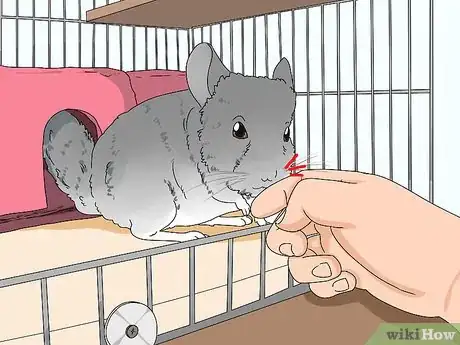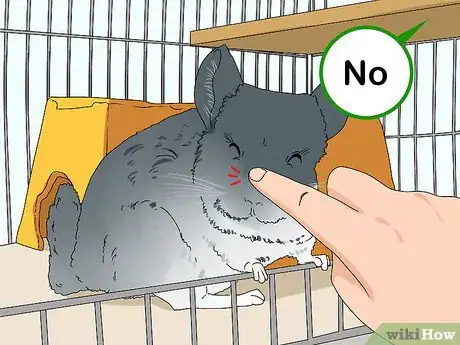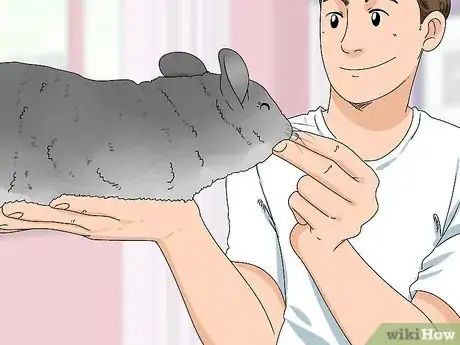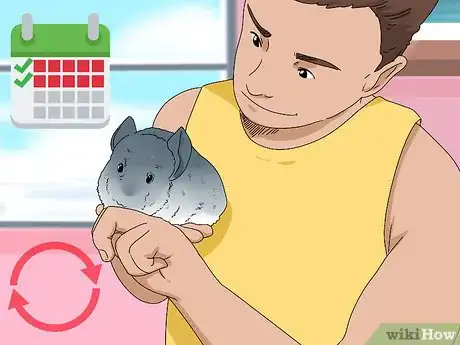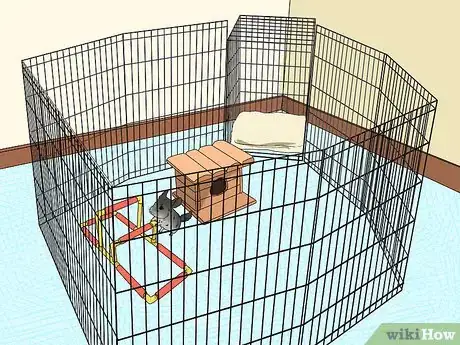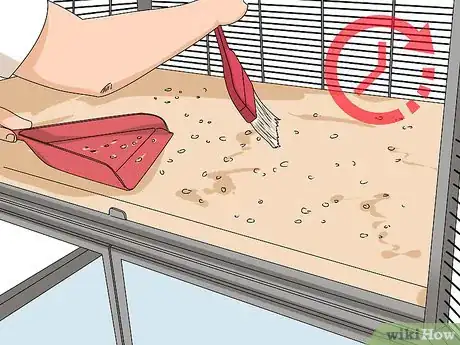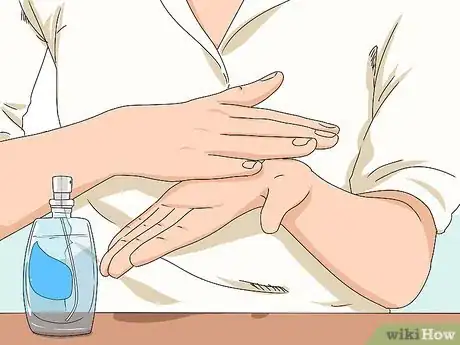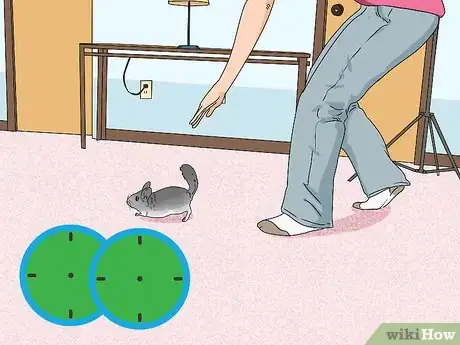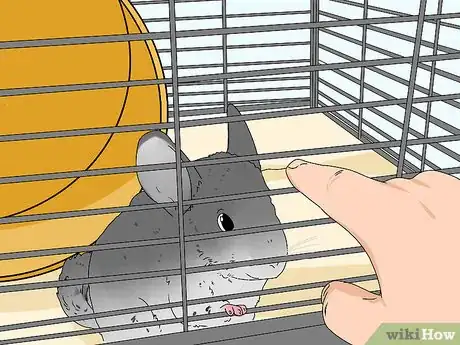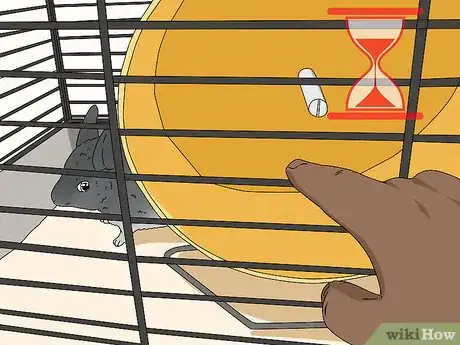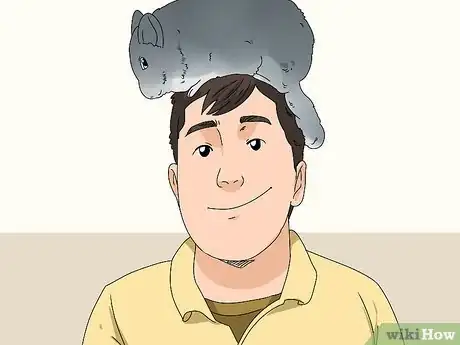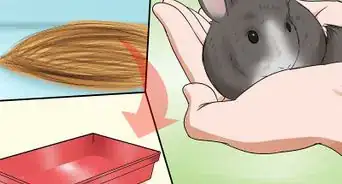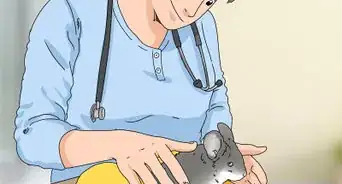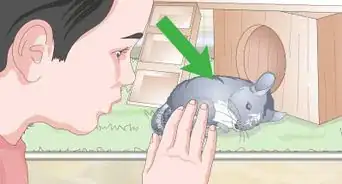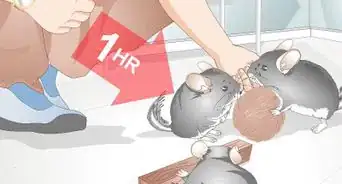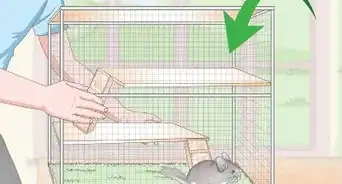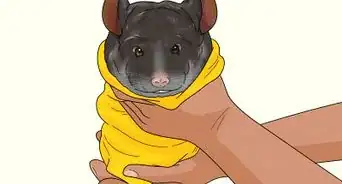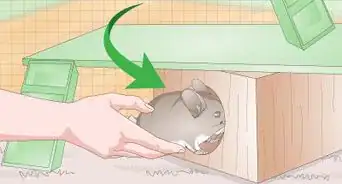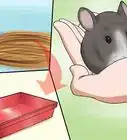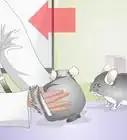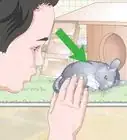This article was co-authored by Pippa Elliott, MRCVS. Dr. Elliott, BVMS, MRCVS is a veterinarian with over 30 years of experience in veterinary surgery and companion animal practice. She graduated from the University of Glasgow in 1987 with a degree in veterinary medicine and surgery. She has worked at the same animal clinic in her hometown for over 20 years.
This article has been viewed 34,935 times.
Chinchillas are adorable, active animals that make great pets for any rodent lover. All rodents nibble and chew as a regular part of their lives, but sometimes chinchillas can show aggressive behaviors and bite their owners out of fear or defense. Giving the chinchilla a nice environment to live in, handling it with care, and being patient as it adjusts to your home will eventually calm the chinchilla's hostile behaviors.
Steps
Handling a Biting Chinchilla
-
1Allow a chinchilla to nibble if it is harmless. Nibbling is a series of small bites around the same area that are near-painless and nonaggressive.[1] If a chinchilla is nibbling and it does not cause you any pain or damage any items, allow the chinchilla to nibble. This lets the chinchilla explore interesting or stimulating things.
- Nibbling is different from an aggressive, painful bite. Biting can occur when a chinchilla is new to its surroundings, frightened, irritated, untrained, not properly socialized with humans, or has been previously mistreated.
- A chinchilla may nibble for a variety of reasons. They use their mouths to explore their environments and may nibble anything that it comes in contact with, including humans.
- Nibbling is also a way that chinchillas will show affection to other chinchillas and to their owners.
-
2Say "No" if the chinchilla bites you. Say “No” in a firm but leveled voice. Loud voices can cause a chinchilla to be frightened and bite down more aggressively.
- Try not to flinch or remove your hand away until the chinchilla stops biting you. Chinchillas learn quickly how you will react to their actions.
- Be stern but gentle when handling the chinchilla. Chinchillas do not respond well to anger or hostility and may become more angry or hostile as a response.
Advertisement -
3Do not remove your hand until the chinchilla stops biting. Do not pull away or react negatively to the chinchilla’s biting. They are smart animals and will learn quickly that biting will get you to leave them alone. Keep your hand in the cage until the chinchilla stops biting and then treat your wound. [2]
- Wash your wound with water and apply antibiotic ointment and a bandage if necessary. If the wound is very painful and does not heal, seek medical attention as you may need stitches.
-
4Repeat this method until the chinchilla stops biting. If the chinchilla has been previously mistreated or neglected, it may take the chinchilla a while to adjust to its surroundings. Allow 2-3 weeks for the chinchilla to become familiar with its environment and learn that biting will not get a reaction from you.
Improving the Chinchilla’s Environment
-
1Choose a large cage for the chinchilla. Chinchillas are energetic rodents and need a cage large enough for them to play, exercise, and be active. Small cages can cause the chinchilla to become aggressive out of boredom and lack of stimulation. [3]
- Placing items like an exercise wheel, chew toys, and a hideaway place will provide outlets for the chinchilla to be active.
- Providing a cover for the cage, like a heavy blanket placed over most of the cage, provides a sense of privacy and security for the chinchilla and it is likely to calm them down. [4]
-
2Keep chinchillas away from other pets. An anxious or frightened chinchilla is more likely to bite. Help reduce environmental stress by providing a calm environment away from other pets such as cats and dogs.[5]
- Chinchillas are a prey species, so they can become very stressed when they are in close proximity to predators.
-
3Clean the chinchilla’s cage regularly. Chinchillas are very clean animals and do not like dirty surroundings. Factors like an excess of fecal matter, hair, any growing fungus, or dirty hay shavings may irritate the chinchilla’s eyes or fur and cause the chinchilla to become agitated and aggressive. Clean their cage and replenish their food and water as needed. [6]
- There are not specific guidelines on how often to clean a chinchilla’s cage, but if your chinchilla is a biter, it may be best to clean the cage at least every week to avoid any possible irritation.
- Put the chinchilla in a safe place large enough to run around in while you clean the cage.
-
4Wash off any aromas on your hands before handling the chinchilla. Chinchillas may bite you if your hands smell like food or any fragrance that they find appealing. This kind of biting is not in aggression, rather just curiosity about the smell. Wash off all scents from your hands before picking up or playing with the chinchilla.
- Avoid using lotions, perfumes, and colognes with strong scents before handling the chinchilla. The fragrance may irritate the animal and cause it to bite. [7]
-
5Let the chinchilla out of its cage for play time. Chinchillas need time to play outside of their cages and bond with their owners. They are energetic animals and even the largest cages can cause them to get bored. Allow the chinchilla at least 1-2 hours of supervised playtime a day outside of their cage.
- Be watchful of the chinchilla as it plays. They are prone to chew on items that are new or interesting to them. It may help to provide some chew toys while they are playing.
- Chinchillas are nocturnal and are usually active at night. Set aside a convenient time in the evening to let them out and play. Avoid waking a chinchilla during the daytime to play or exercise.
- Giving the chinchilla TV time while in the cage will also give them stimulation during the nighttime hours that you are asleep. [8]
Gaining the Chinchilla’s Trust
-
1Put your hand or finger inside of its cage door. Do not reach inside the cage and invade the chinchilla’s space. Leave your hand there for a few minutes to alert the chinchilla of your presence and observe its reactions.
- Any quick motions inside its cage may frighten the chinchilla and cause it to bite. Be gentle and wait for the chinchilla to react. [9]
-
2Wait for the chinchilla to come to you. Do not force the animal to come to you or move your hand further into the cage. Chinchillas are naturally curious animals and will eventually come over to sniff and possibly nibble on your hand. Allow the animal time to get used to you.
- If the chinchilla seems to become comfortable with you, try to gently scratch or pet it. The chinchilla may run away at first but will slowly get used to the affection.
-
3Spend time with the chinchilla. Bonding with your chinchilla will make the animal more comfortable with you over time. Play with the chinchilla while it is out of its cage, check on it when it is in its cage, and be sure to restock any chew toys or pillows that have worn out.
Warnings
- Not all chinchillas like to be picked up. If you have tried these methods and chinchilla does not bite you while in its cage or during play time but bites when you pick it up, avoid picking it up unless necessary.⧼thumbs_response⧽
- Do not punish the chinchilla by not giving it play time. This will cause the chinchilla to become more agitated and⧼thumbs_response⧽
References
- ↑ https://be.chewy.com/an-answer-to-why-chinchillas-bite/
- ↑ https://lovemychinchilla.com/how-to-stop-a-chinchilla-being-aggressive/
- ↑ http://www.chincare.com/HealthLifestyle/RelatingEnvironment.htm
- ↑ http://www.chincare.com/HealthLifestyle/RelatingEnvironment.htm
- ↑ http://www.chincare.com/HealthLifestyle/RelatingEnvironment.htm
- ↑ http://chinchillachronicles.com/chinchilla_cage_maintenance.html
- ↑ http://www.chincare.com/HealthLifestyle/RelatingEnvironment.htm
- ↑ http://www.chincare.com/HealthLifestyle/RelatingEnvironment.htm
- ↑ https://lovemychinchilla.com/how-to-stop-a-chinchilla-being-aggressive/
